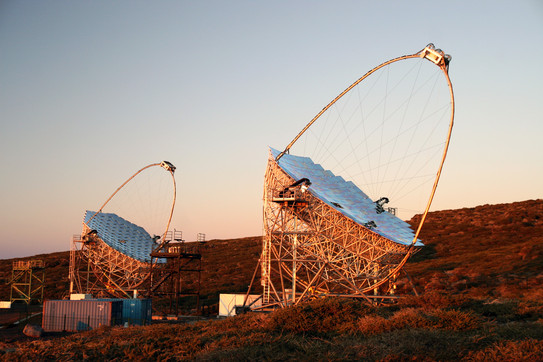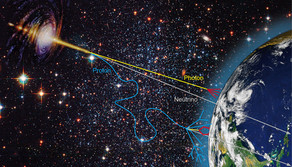Gamma-ray Astronomy
In Dortmund, we focus on ground-based gamma astronomy with imaging atmospheric Cherenkov telescopes. These telescopes are sensitive to the very faint light pulses of Cherenkov light, which are only a few nanoseconds long and are produced by extended air showers in the atmosphere.
With Cherenkov light, these telescopes are able to measure gamma rays in the energy range from only 30 GeV to several hundred TeV.

The use of high-energy gamma rays offers a unique view into the universe. Only the most extreme objects, such as supernova remnants in our own Milky Way and supermassive black holes at the centers of other galaxies, are sources of gamma rays at TeV energies.
Focus in Dortmund
We are focusing on improving the sensitivity of these instruments by developing new machine-learning oriented analysis methods, improving the extensive simulations required for these instruments, and solving the inverse problems encountered in estimating the spectral energy distribution of the cosmic gamma-ray source.
To put all this together, we are also part of the open gamma-ray astronomy community, developing common data formats and analysis tools.
In the field of multi-messenger astronomy, we are also particularly interested in radiation emissions that are spatially and temporally coincident with astrophysical neutrinos detected by IceCube.
Experiments
Our group is a member of three international collaborations in Cherenkov astronomy. MAGIC is an array of two 17 m telescopes at the Roque de los Muchachos Observatory on La Palma, Spain and one of the most sensitive observing Cherenkov telescopes currently available. FACT is a smaller 4 m-diameter telescope right next to MAGIC that demonstrates the feasibility of modern silicon photomultipliers in Cherenkov astronomy and for continuous monitoring of brightly active Galactic nuclei. CTA will be the next generation and most sensitive telescope array ever built. Currently in the design and construction phase, work here is focused primarily on simulation and analysis software.

![[Translate to English:] [Translate to English:]](/storages/app-physik/_processed_/3/a/csm_APPGroupphoto2023_001_small_858e4405eb.jpg)


